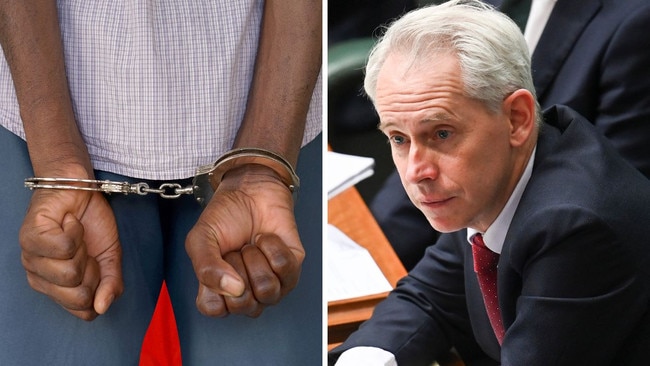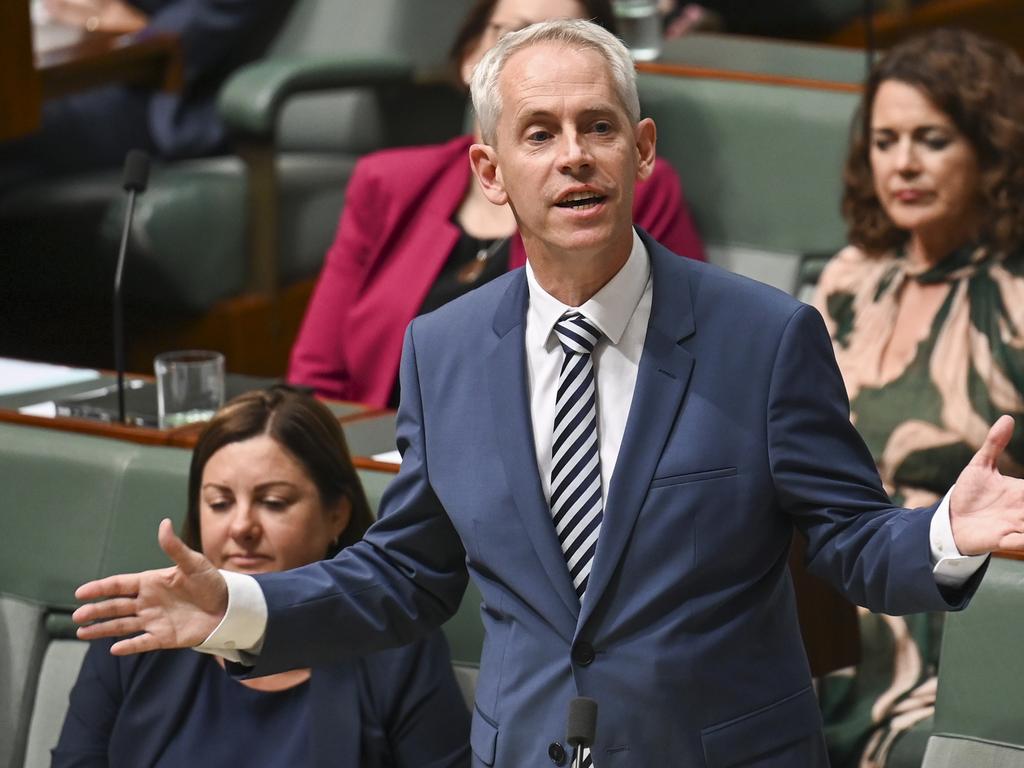Freed immigration detainees back to haunt Labor
Labor’s bid to neutralise the crisis over its bungling of foreign criminals being released from detention faces collapse, after the Federal Court freed a man who attacked his wife with a meat cleaver.

Labor’s bid to neutralise the crisis over its bungling of foreign criminals being released from detention faces collapse, after the Federal Court ruled against an order from dumped former minister Andrew Giles and freed a man who attacked his wife with a meat cleaver.
In the latest blow to the Albanese government’s immigration detention regime, the Federal Court has ruled in favour of a Bhutan-born domestic violence offender who argued that Mr Giles’s decision to personally intervene to strip him of his visa was unreasonable.
The Coalition has warned that more detainees could evade the government’s attempts to prevent them from walking free of immigration detention, raising questions about how Mr Giles’s successor, Tony Burke, can move to stop criminals being released into the community.
Amid political pressure, Mr Giles moved to cancel dozens of visas of foreign criminals who had been allowed to remain in Australia. The minister’s scramble came after The Australian revealed last May that offenders, including rapists and armed robbers, had used his flawed Direction 99 to avoid deportation.
The Bhutanese man, who belongs to the persecuted Lhotshampa minority and was identified only as PLQF, challenged the lawfulness of the minister’s exercise of power after his visa was cancelled in June, resulting in him being returned to immigration detention.
The man, who spent much of his childhood in a refugee camp in Nepal, was released into the community in August on a bridging visa after his lawyers told Mr Burke that PLQF must be released under a landmark 2023 High Court ruling that indefinite detention was unlawful.
Federal Court judge Nye Perram ruled last month that Mr Giles had made multiple “jurisdictional errors” by reversing an Administrative Appeals Tribunal decision that PLQF could remain in Australia, because he had failed to consider the impact of the cancellation on his children and his status as a stateless person.
The decision said the man was a “member of the NZYQ cohort”, meaning he was captured by the November 2023 decision that non-citizens who could not be returned to their home country but were not eligible for a visa could not be indefinitely detained.
After more than a year of constitutional and immigration uncertainty following the NZYQ decision and Direction 99 scandal, a Home Affairs Department spokeswoman said the government was aware of the recent ruling. “The department is considering the judgment,” the spokeswoman said.
PLQF, who has been diagnosed with schizophrenia, PTSD and alcohol-use disorder, was originally stripped of his protection visa after he was convicted of a string of offences against his wife, including breaching a domestic violence order, assault and property damage after he attacked her with a meat cleaver and damaged her vehicle. In one incident he threatened to kill his wife, who sought refuge with some neighbours, one of whom he struck five or six times with the cleaver.
Justice Perram also found Mr Giles had made an error in stating the applicant could apply for a special visa created to place monitoring conditions on the NZYQ detainees – a Bridging Visa R – because it could only be issued following an invitation by the minister. “The minister’s decision of 15 June 2024 must be quashed,” said the December 18 decision.
“Whether the minister seeks to exercise the cancellation power again will be for him to decide. The minister must bear the applicant’s costs as taxed, assessed or otherwise agreed.”
The PLQF decision was handed down weeks after Mr Giles’s former department was lashed in a separate Federal Court judgment for “lapses in the quality of staff work” including typos.
The government won the case filed by an Iranian man, anonymised as EUD24, who had sought to reverse Mr Giles’s decision to personally cancel his visa on June 2. His lawyers had argued the decision to strip EUD24 of his visa was unreasonable, and pointed to a litany of examples of “poor staff work” in the department’s submissions including typos and incorrect references to legislation.
The Iranian was convicted of common assault and sentenced to a year in prison after he assaulted his partner when she was 36 weeks pregnant. The AAT’s decision to return the man’s visa because of his ties to Australia drew public criticism during the fallout from the Direction 99 debacle. An appeal had since been filed in this case, a Home Affairs spokeswoman said.
Opposition home affairs spokesman James Paterson criticised the government for its handling of immigration cases, declaring that only the Coalition would “put the safety and security of Australians first and clean up Labor’s immigration messes”.
“The Albanese government’s chaotic and incompetent management of our migration system continues to risk the safety of the Australian public,” Senator Paterson said.
“Their soft ministerial directions are being overturned in the courts by hardened-criminals and their sloppy paperwork jeopardises even more.”
Opposition immigration spokesman Dan Tehan said Labor “always makes a mess of immigration”, criticising Mr Giles for failing to review the impact of Direction 99.
Mr Giles was forced to replace the flawed ministerial direction with a new order, Direction 110, before he was stripped of the immigration portfolio in a ministerial reshuffle in late July. Mr Burke was handed the immigration and home affairs portfolios. Direction 99 required tribunal members to place greater consideration on the strength of a non-citizen’s ties to Australia, in deciding whether to deport them over criminal convictions or other character concerns.






To join the conversation, please log in. Don't have an account? Register
Join the conversation, you are commenting as Logout